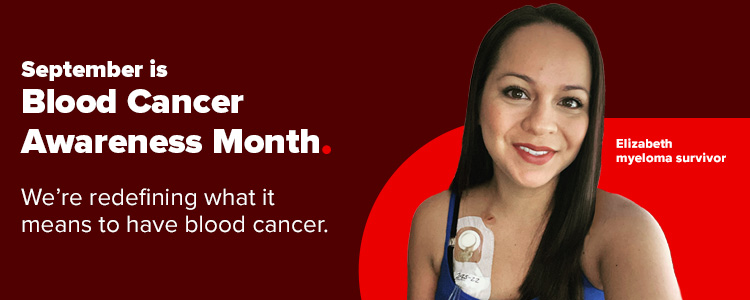Science historian June Goodfield wrote, “Cancer begins and ends with people.”
This Blood Cancer Awareness Month, it’s important to know that The Leukemia & Lymphoma Society (LLS) is on a mission to cure blood cancers and improve quality of life for the nearly 1.7 million people in the U.S. living with or in remission from blood cancer.
LLS is all about people—an organization full of people who are united in the urgent effort to help every person impacted by blood cancer.
And this is our mission. A mission to cure blood cancer and to enable blood cancer patients and survivors to have better, fuller lives. By funding innovative research and offering FREE resources and support, we’re pushing to redefine what a blood cancer diagnosis means for patients and survivors. Wherever they are in their diagnosis.
So, what is blood cancer?
Blood cancer is a group of more than 100 cancers that most often begin in the bone marrow and can affect blood cells, lymph nodes, and other parts of the lymphatic system. Blood cancers occur when abnormal blood cells crowd out normal cells, interfering with the ability of normal blood cells to fight infection and reproduce.
Many people discount their symptoms. Exhaustion or random aches and pains are often blamed on stress or age. Night sweats and recurring fevers sometimes get written off as a virus. Lots of itching… must be an allergy. Or a broken bone is usually just seen as just an accident.
They seem like innocent symptoms that can be associated with other common ailments, but any of them could point to blood cancer.
Many people aren’t familiar with blood cancer. In fact, some patients who have been diagnosed with leukemia or lymphoma, myeloma, myelodysplastic syndromes, or myeloproliferative neoplasms, may not realize they have a form of blood cancer.
Not knowing is a problem.
Why? Because blood cancer patients, survivors, caregivers, or family members of someone with a blood cancer might be missing out on valuable help. Everyone can access many FREE resources and a wide variety of support through LLS.
It’s why we’ve existed for 75 years.
LLS is here for patients after diagnosis…
- Providing access to blood cancer Information Specialists, highly trained oncology social workers and nurses who work one-on-one with patients, families, and caregivers to answer questions about treatment and provide FREE access to resources and support
- Connecting patients and families to Clinical Trial Nurse Navigators—to help patients find and enroll in a clinical trial based upon detailed, individualized assessments and provide support throughout the entire clinical trial process
We’re here through treatment, offering:
- Peer-to-peer support through The Patti Robinson Kaufmann First Connection® Program, which connects patients and caregiver to others who have had similar experiences
- FREE Nutrition Services - The Leukemia & Lymphoma Society’s Nutrition Education Services Center connects cancer patients (not just blood cancer) and their families with registered dieticians with expertise in oncology nutrition who provide free one-on-one consultations by phone
- LLS Community, an online gathering place for patients, caregivers and healthcare professionals to connect, sharing experiences and providing support
We’re here in remission and beyond, with:
- FREE resources for survivors, including connections to financial support, informational booklets and other materials, educational videos, webcasts, online chats, and resources in your own community
- A Survivorship Workbook to collect all the important information one needs throughout diagnosis, treatment, follow-up care, and long-term management of a blood cancer
And we’re here for caregivers, providing:
- Caregiver support that includes strategies and resources
- A Caregiver Workbook to help guide caregivers to support adults through their blood cancer experience as well as a Caring for Kids and Adolescents With Blood Cancer workbook
- The Healthy Communication Practice Program, a program created to support blood cancer caregivers. This program was funded by LLS and developed in partnership with a research team at the University of Florida.
